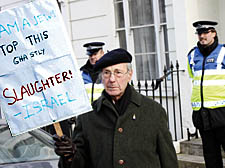|
|
 |
| |

Leslie Baruch Brent outside the Foreign Secretary’s home |
The only way out of this mess is to engage Hamas in dialogue
Leslie Baruch Brent, onetime child refugee from Hitler’s Germany whose family was murdered by Nazis, protests: ‘I am a Jew. Stop this ghastly slaughter, Israel’
I CAME to this country in a Kindertransport in December 1938, thus escaping the fate that overtook my parents, sister and other relatives when they were callously murdered by the Nazis in 1942 in the woods near Riga.
Towards the end of 1943, at the tender age of 18, I volunteered for the British army and served in Ireland, Italy and Germany before being released with the rank of Acting Captain in the autumn of 1947.
I then studied zoology at the University of Birmingham and became an immunologist in the field of tissue and organ transplantation, and I spent the last 20 years of my academic career as Professor of Immunology at St Mary’s Hospital Medical School.
Perhaps my background accounts for the fact that I have tended to side with the underdog, a process that began in the mid-1930s when Mussolini’s Italy fought the Abyssinians – an unequal struggle, with dive bombers and tanks against spears and bows and arrows. I remember cheering each time the German radio announced a minor, if transient, Abyssinian victory.
It is therefore hardly surprising that I am deeply shocked at the Israeli assault on Hamas and the Palestinians in Gaza, a relatively small area housing a million and a half people that has been economically and socially strangulated by the Israeli government in recent months. Conflict is hardly ever simple, and mistakes have been made on both sides.
I do not condone the rockets launched by Hamas against Israeli towns, but at the same time I can understand that these are desperate acts of desperate men – call them terrorists or freedom fighters, the distinction is often blurred – against an enemy with vastly superior and deadly weapons and with atomic bombs in reserve in their arsenal.
Of course, Hamas are wrong in refusing Israel the right to exist, and this attitude will have to be changed.
But I do not believe that it can or will be changed by the brutal assault that the Israeli army, air force and navy have launched against Hamas in the past three weeks, with the loss of so many lives and a vast number of wounded and terrified Palestinians.
Indeed, such a campaign is bound to be counter-productive, as it was in the Lebanon. For every terrorist killed, for every civilian killed, for every child killed, a dozen more will join their ranks and the hatred engendered will be with us for generations to come and make any eventual settlement infinitely more difficult. There can be only one way, and that is to engage with Hamas in a dialogue.
This may sound unrealistic right now but it has not been tried; and remember that it was dialogue with the IRA, at first behind closed doors, that finally and after tortuous negotiations led to peace and a shared government in Northern Ireland.
I am a secular Jew but a Jew nonetheless.
I had my Bar Mitzvah just before leaving Berlin, though my religious beliefs and affiliations were eroded by the Holocaust and by my subsequent scientific education as a biologist. But I feel deeply that a terrible injustice is being committed by the Israelis against the Palestinians in Gaza. If these air strikes are “surgical”, as they have been described by the Israelis, I certainly would not want to be operated on by an Israel surgeon!
I fear that a crime against humanity is being carried out in the name of self-protection, and whilst there are a significant number of Israeli as well as British Jews who have voiced their opposition (the Israelis and especially the “refusniks” with great courage), I regret that the majority support the Israeli government’s actions.
I believe this attitude to be misguided and suspect that such blind loyalty owes its existence at least in part to the terrible events of the Holocaust. But historical comparisons can be fallacious, and while Israel is as well armed as it is and has a staunch ally in the most powerful country in the world the idea that it might be “wiped off the face of the Earth”, as many thoughtless Palestinians have been known to declaim, is not to be taken seriously.
There is one further dimension. Those who are opposed to Israel’s actions often find it difficult to distinguish between Israel and Jews in the diaspora, and their hatred can so easily turn against the local Jewish population. Thus I see the rise in anti-Semitism in the UK as an almost unavoidable, if deeply regrettable, consequence of the war against Gaza.
The existence of British organisations such as Jews for Justice for Palestinians, and Jewish Independent Voices, is an important reminder that there are Jews who are resolutely opposed to what is happening in Gaza.
|
 |
|
 |
| |
| |
|
 |
|